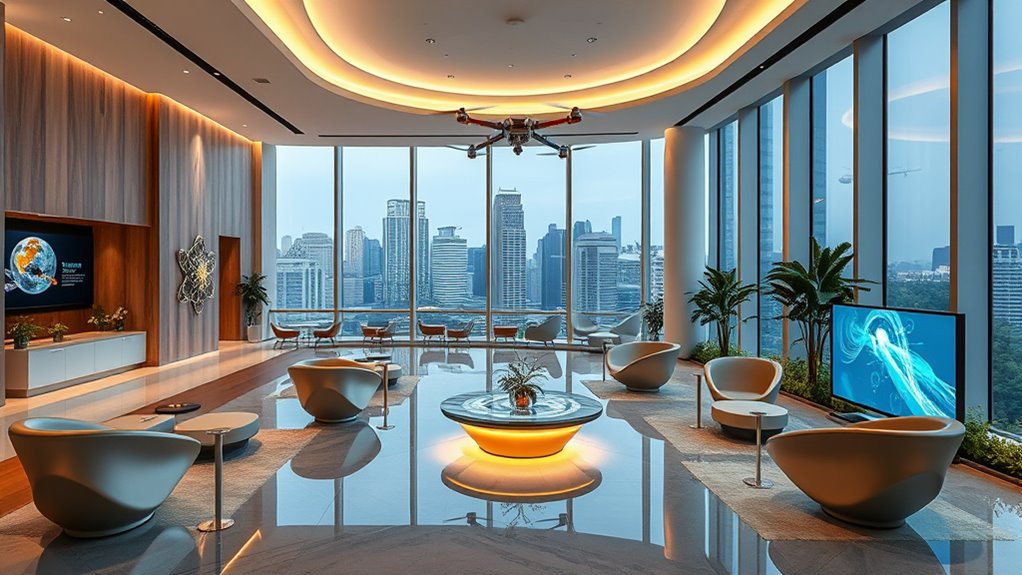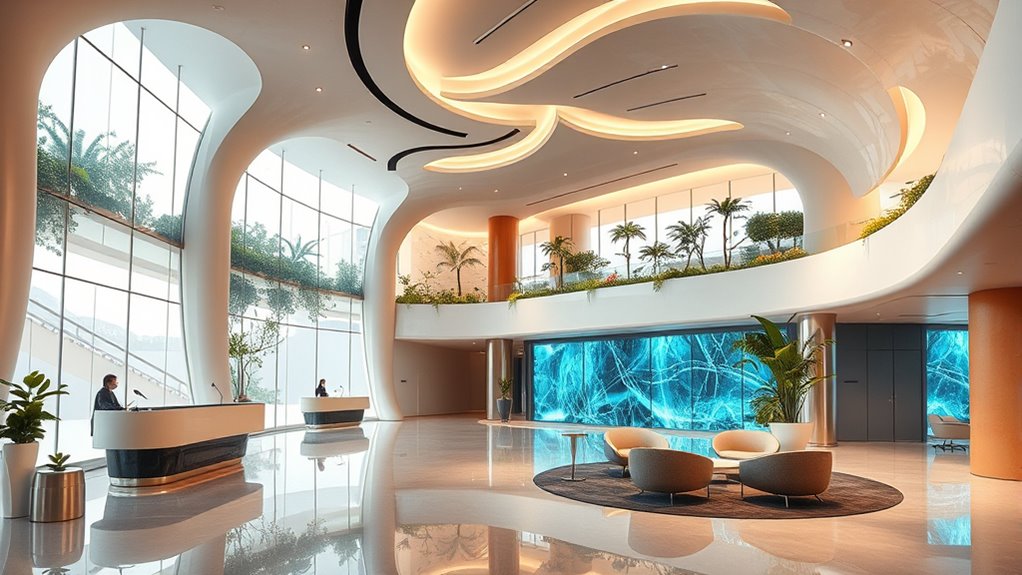In 2025, hotel design is all about blending sustainability, technology, and authentic local culture. Expect eco-friendly materials, energy-efficient systems, and smart features like keyless check-ins for a seamless stay. Flexible spaces will adapt to your needs, whether for work or relaxation, while wellness amenities promote overall well-being. Hotels will also showcase regional art and stories, creating meaningful experiences. Stay tuned to discover how these trends reshape your future hotel experiences.
Key Takeaways
- Sustainable materials and energy-efficient systems will dominate hotel construction, reducing environmental impact and aligning with eco-conscious traveler preferences.
- Integration of smart technology like keyless check-ins and AI-powered personalization will enhance guest convenience and tailored experiences.
- Hotels will showcase local culture through authentic design elements, storytelling, and regional art to create memorable, immersive environments.
- Flexible, multifunctional spaces will become standard, supporting diverse activities and adapting swiftly to evolving guest needs.
- Wellness-focused amenities and holistic hospitality features will expand, emphasizing health, relaxation, and restorative experiences.

As the hospitality industry evolves, future hotel design is increasingly shaped by a blend of innovation, sustainability, and authenticity. You’ll find that hotels are integrating eco-friendly practices, such as using locally sourced materials and energy-efficient systems, which not only reduce environmental impact but also enrich the guest experience. Technology plays a pivotal role, with features like keyless check-ins and smart room controls making stays more convenient and personalized. Imagine walking into your room and adjusting the lighting, temperature, or even requesting services through intuitive interfaces—these advancements streamline your visit and elevate comfort. Deeper connections are driving the growth of micro-communities in travel, which influences how hotels are designing spaces to foster social interaction and community engagement. Designs are also leaning heavily into local authenticity. Hotels now incorporate regional culture and art, creating environments that feel unique and connected to their surroundings. You’re likely to encounter interiors infused with local narratives, vintage furnishings, and bold accents that tell a story about the destination. This approach fosters a genuine connection to the area, making your stay more memorable. Adaptive spaces are another trend, emphasizing flexibility to accommodate diverse guest needs. Hotels are designing multifunctional areas that can transform quickly, providing spaces for work, relaxation, or social interaction without feeling cluttered or disconnected. Wellness facilities have become an integral part of modern hotel design, with many properties expanding their offerings to include holistic health options such as yoga studios, nutritional cafes, and outdoor relaxation zones that promote health and relaxation. These features are seamlessly integrated into the hotel environment, reflecting a holistic approach to hospitality. Sustainability remains at the forefront, too. Hotels are implementing waste reduction initiatives, sourcing materials locally, and adopting energy-efficient systems to lower their carbon footprint. Green certifications are increasingly sought after, signaling a hotel’s commitment to eco-conscious practices that resonate with environmentally aware travelers like you. Incorporating refrigeration cycle understanding into design can further optimize energy efficiency and reduce operational costs, making sustainable practices more achievable. Additionally, understanding the spiritual energy within hotel environments can enhance guest well-being, creating a more harmonious and restorative atmosphere. Innovation in materials is also shaping future hotel design, as new sustainable and adaptive materials enable more creative and eco-friendly constructions. Embracing maintenance practices such as regular cleaning and inspection can also greatly prolong the lifespan of hotel facilities and ensure consistent guest satisfaction. Technology continues to drive innovation within guest experiences. AI-powered systems personalize your stay, offering tailored recommendations and streamlined services. Larger lobbies now serve as social hubs, encouraging community interaction and making the hotel feel less like a space for just sleeping and more like a vibrant gathering point. Dual-brand properties and extended-stay hotels are also gaining popularity, providing diverse experiences and amenities for different types of travelers. These trends ensure that your experience is seamless, engaging, and adaptable to your preferences. In the future, hotel design will be characterized by its ability to blend sustainability, local culture, and cutting-edge technology. It’s about creating environments that are authentic, efficient, and personalized—making your stay not just comfortable but meaningful and aligned with the evolving values of the industry.
Frequently Asked Questions
How Will Sustainability Influence Hotel Construction Materials by 2025?
Sustainability will substantially shape hotel construction materials by 2025, and you’ll notice a shift towards eco-friendly choices. You’ll use materials like bamboo, recycled steel, and rammed earth, which have low environmental impacts. Recycled plastics for carpets, locally sourced resources, and low-VOC paints will become standard, helping you create greener, healthier spaces. Incorporating these sustainable materials reduces your project’s carbon footprint and aligns with evolving eco-conscious guest expectations.
What Role Will AI Play in Personalized Guest Experiences in Future Hotels?
AI will be your hotel’s secret ingredient, turning ordinary stays into personalized adventures. It analyzes your data like a skilled detective, tailoring everything from room ambiance to activity suggestions. With AI handling check-ins, offers, and even predictive maintenance, your experience feels seamless and effortless. It’s like having a personal concierge who knows you better than you know yourself, ensuring every moment is customized for maximum comfort and satisfaction.
Will Virtual Reality Replace Physical Hotel Tours Before 2025?
You wonder if virtual reality will replace physical hotel tours before 2025. While VR is rapidly growing, it’s unlikely to fully replace in-person visits soon. VR offers immersive previews and convenience, but many guests still value experiencing the ambiance firsthand. Hotels will continue using VR as a supplementary tool, enhancing decision-making, but physical tours will remain essential for detailed, tactile assessments until technological and cost barriers diminish considerably.
How Will Hotel Design Adapt to Increasing Health and Safety Concerns?
Think of hotel design as a fortress, constantly evolving to keep you safe. You’ll notice touchless check-ins, smart room controls, and digital keys that eliminate shared surfaces. Enhanced cleaning with UV-C light and robots, plus air filtration systems, act like invisible shields. Wellness amenities and eco-friendly materials create a sanctuary for your health. These changes form a modern armor, ensuring your safety and comfort are front and center in every space you explore.
What Innovations Will Optimize Energy Efficiency in Hotel Operations?
You can optimize energy efficiency by integrating smart technologies like HVAC systems, occupancy sensors, and smart thermostats that adapt to real-time usage. Solar panels, wind turbines, and geothermal systems help reduce reliance on non-renewable sources. Additionally, using energy management systems, automated lighting, and energy storage guarantees smarter energy use. These innovations cut costs, lower environmental impact, and create a more sustainable hotel operation, aligning with eco-conscious guest expectations.
Conclusion
As you explore the evolving landscape of hotel design, you’ll notice subtle shifts shaping a more personalized, sustainable experience. While the future might gently steer towards innovation, it’s also about embracing comfort and authenticity. These trends invite you to see beyond the surface, offering a more meaningful stay. Keep an open mind, and you’ll discover that the best journeys often come from the quiet, thoughtful changes—delightfully understated yet profoundly impactful.









